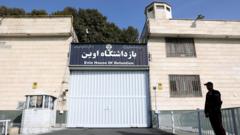**In a surprising announcement, President Trump confirmed that Israel and Iran have agreed to a cease-fire, curtailing recent violence that escalated fears of a wider regional war.**
**Cease-Fire Agreement Between Israel and Iran Announced Amid Rising Tensions**

**Cease-Fire Agreement Between Israel and Iran Announced Amid Rising Tensions**
**Historic truce follows days of intense conflict, with U.S. involvement critical to negotiations.**
June 24, 2025, marks a pivotal moment in Middle Eastern diplomacy as Israel and Iran have come to a cease-fire agreement, concluding 12 days of hostilities that had raised alarms globally. The truce was announced in separate statements, with President Trump revealing details via social media. Despite the announcement, specifics about the terms of the agreement remain scarce.
The cease-fire was heralded as a necessary measure to restore stability in the region following a series of retaliation strikes and missile attacks. A graphic sequence of events over the last few days included Iranian missile strikes on Israeli territory, resulting in civilian casualties and heightened air raid alerts across the region. Surveillance footage captured scenes of damage in cities like Beersheba, where residential areas were targeted, causing chaos in daily life.
On June 24, reports indicated a rise in casualties in southern Israel due to the ongoing missile barrage, with emergency services working overtime to stabilize the situation. In the aftermath of President Trump's announcement, Iranian media echoed the sentiment of restraint, suggesting a conducive setting for peace talks might have been established.
The truce announcement came amid a backdrop of military action, including U.S. strikes on key Iranian nuclear sites, which, according to officials, set the stage for fruitful negotiations. As coordination efforts were undertaken by Qatari mediators, both nations found a tenuous line to improve diplomatic relations.
As of this writing, questions linger around the enduring peace and whether military operations will cease entirely. The situation remains fluid, and safety measures, including restrictions on businesses and schools throughout Israel, indicate the cautious standstill of daily life.
The implications of this cease-fire extend beyond the immediate conflict, with potential shifts in regional alliances and a hopeful trajectory for future diplomatic engagements. However, analysts warn of the unpredictable nature of such agreements, emphasizing the importance of verification and sustained dialogue moving forward.
This development represents a critical juncture in Middle Eastern politics, showcasing the complexities of international diplomacy in the face of longstanding conflicts.
The cease-fire was heralded as a necessary measure to restore stability in the region following a series of retaliation strikes and missile attacks. A graphic sequence of events over the last few days included Iranian missile strikes on Israeli territory, resulting in civilian casualties and heightened air raid alerts across the region. Surveillance footage captured scenes of damage in cities like Beersheba, where residential areas were targeted, causing chaos in daily life.
On June 24, reports indicated a rise in casualties in southern Israel due to the ongoing missile barrage, with emergency services working overtime to stabilize the situation. In the aftermath of President Trump's announcement, Iranian media echoed the sentiment of restraint, suggesting a conducive setting for peace talks might have been established.
The truce announcement came amid a backdrop of military action, including U.S. strikes on key Iranian nuclear sites, which, according to officials, set the stage for fruitful negotiations. As coordination efforts were undertaken by Qatari mediators, both nations found a tenuous line to improve diplomatic relations.
As of this writing, questions linger around the enduring peace and whether military operations will cease entirely. The situation remains fluid, and safety measures, including restrictions on businesses and schools throughout Israel, indicate the cautious standstill of daily life.
The implications of this cease-fire extend beyond the immediate conflict, with potential shifts in regional alliances and a hopeful trajectory for future diplomatic engagements. However, analysts warn of the unpredictable nature of such agreements, emphasizing the importance of verification and sustained dialogue moving forward.
This development represents a critical juncture in Middle Eastern politics, showcasing the complexities of international diplomacy in the face of longstanding conflicts.





















